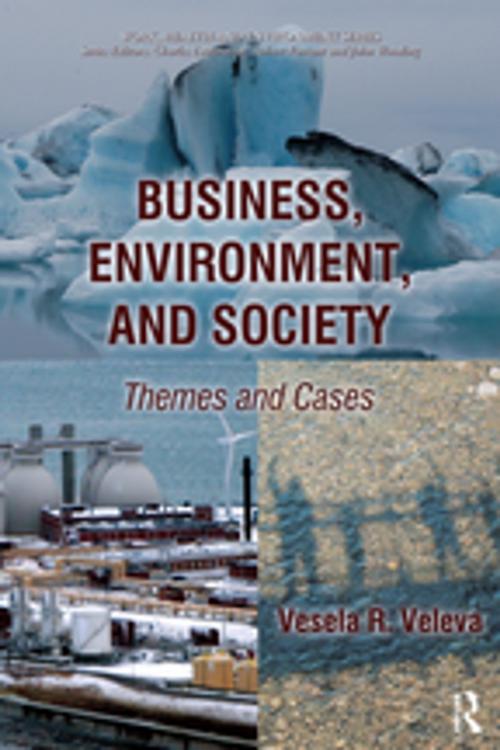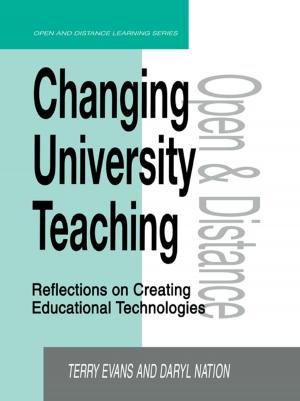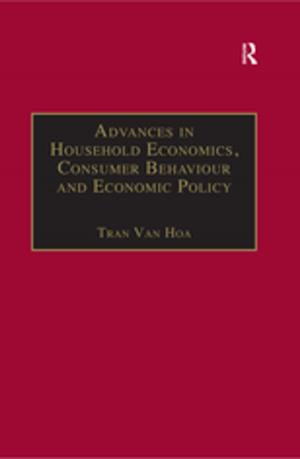Business, Environment, and Society
Themes and Cases
Nonfiction, Health & Well Being, Psychology, Mental Health| Author: | Vesela R. Veleva, Charles Levenstein, John Wooding, John Forrant | ISBN: | 9781351868600 |
| Publisher: | Taylor and Francis | Publication: | December 5, 2016 |
| Imprint: | Routledge | Language: | English |
| Author: | Vesela R. Veleva, Charles Levenstein, John Wooding, John Forrant |
| ISBN: | 9781351868600 |
| Publisher: | Taylor and Francis |
| Publication: | December 5, 2016 |
| Imprint: | Routledge |
| Language: | English |
This book blends theory and practice to support courses in corporate social responsibility (CSR), business and society, and environmental management and sustainability. Based on her extensive work with companies, the author offers engaging readings and teaching cases that address key challenges for business today - measurement, supply chain management, public policy, and stakeholder pressures. Part I focuses on the macro-level and provides an overview of concepts such as the green economy, eco-industrial parks, corporate social responsibility (corporate citizenship), nanotechnology, and sustainable consumption. Part II provides specific frameworks and tools for sustainability management and measurement at the company level. Part III includes detailed teaching cases of several well-known firms. The main theme is that business is a key player in achieving a more sustainable development, yet its practices are often narrow in focus or shortsighted. The text provokes discussions around issues such as: Is business sustainability possible in a market economy focused on increasing consumption? Should a product or service be called "green" when it puts at risk the health and safety of workers? What can U.S. policymakers learn from their European counterparts when it comes to protecting human health and the environment? How can we ensure that the benefits of nanotechnology exceed its risks? How can sustainability indicators be used as a tool to advance sustainability by companies and policymakers? The book provides a flexible, up-to-date supplementary teaching tool for undergraduate and graduate students, executive education courses, and certificate programs. Intended Audience: Primarily undergraduate and graduate students taking courses in environmental management, corporate social responsibility (CSR), sustainability, or business and society; as a supplementary text in professional education and certificate programs in environmental management, corporate citizenship, sustainability, and CSR.
This book blends theory and practice to support courses in corporate social responsibility (CSR), business and society, and environmental management and sustainability. Based on her extensive work with companies, the author offers engaging readings and teaching cases that address key challenges for business today - measurement, supply chain management, public policy, and stakeholder pressures. Part I focuses on the macro-level and provides an overview of concepts such as the green economy, eco-industrial parks, corporate social responsibility (corporate citizenship), nanotechnology, and sustainable consumption. Part II provides specific frameworks and tools for sustainability management and measurement at the company level. Part III includes detailed teaching cases of several well-known firms. The main theme is that business is a key player in achieving a more sustainable development, yet its practices are often narrow in focus or shortsighted. The text provokes discussions around issues such as: Is business sustainability possible in a market economy focused on increasing consumption? Should a product or service be called "green" when it puts at risk the health and safety of workers? What can U.S. policymakers learn from their European counterparts when it comes to protecting human health and the environment? How can we ensure that the benefits of nanotechnology exceed its risks? How can sustainability indicators be used as a tool to advance sustainability by companies and policymakers? The book provides a flexible, up-to-date supplementary teaching tool for undergraduate and graduate students, executive education courses, and certificate programs. Intended Audience: Primarily undergraduate and graduate students taking courses in environmental management, corporate social responsibility (CSR), sustainability, or business and society; as a supplementary text in professional education and certificate programs in environmental management, corporate citizenship, sustainability, and CSR.















